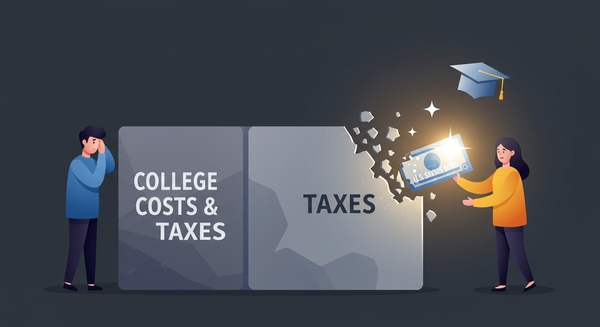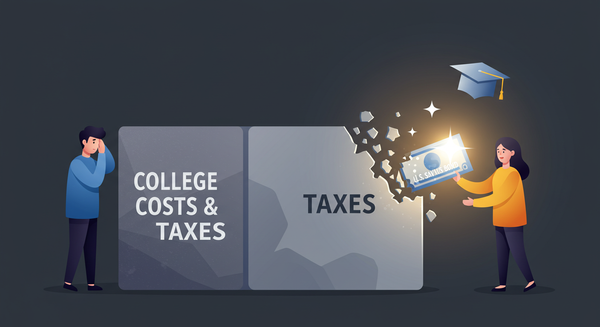College Planning Edition Episode 11 - Don't Pay Taxes on Scholarships? Grant & Tuition Reduction Rules You NEED to Know!
YouTube
Spotify
Resources

Show Notes
Got Education Money? Let’s Talk Taxes on Scholarships, Grants, and Tuition Reductions
(Based on the Safe Simple Sound Podcast - College Planning Edition)
(Word Count: ~1450)
Hey everyone, navigating the world of college finances can feel like a maze. You work hard to secure scholarships, grants, or maybe even benefit from tuition reductions. Getting that financial help is fantastic! But then comes the often-dreaded question, especially around tax time: Do I owe taxes on this money?
It's a common point of confusion, and getting it wrong can lead to unexpected tax bills or stressful letters from the IRS. Today, we're diving deep into the tax implications of these common forms of education funding, drawing directly from the rules outlined in IRS Publication 970, Chapter 1: Tax Benefits for Education.
Think of this as your guide to understanding:
- When scholarships and grants are blessedly tax-free.
- What the IRS considers 'qualified education expenses' (and why it matters SO much).
- The common pitfalls that make your aid taxable.
- The specific rules around tuition reductions for employees of educational institutions.
Understanding this isn't just about compliance; it's about Seizing Financial Control and Understanding Your Financial Choices – core principles we champion here at Safe Simple Sound. Knowing the rules empowers you to plan better, budget accurately, and avoid costly surprises.
Taxes might seem complicated, but we're here to break down these specific rules into clear, actionable information. Let's make this safe, simple, and sound!
Segment 1: The Basics - Is My Scholarship or Grant Tax-Free?
Let's start with the question on everyone's mind: Is the scholarship or grant money I received tax-free?
The General Rule (Good News!)
Okay, take a breath. Generally speaking, scholarships and fellowship grants can absolutely be tax-free. Phew! Right? This helps ease that initial scholarship tax panic. The goal for many is securing that tax-free scholarship.
However – and this is crucial – it's not automatic. To keep that money out of Uncle Sam’s reach, you must meet specific conditions.
Condition 1: You Must Be a 'Candidate for a Degree' at an 'Eligible Educational Institution'
Let's translate that IRS-speak:
- Candidate for a Degree: This means you're actively enrolled and pursuing a recognized educational credential. Think associate's, bachelor's, master's, Ph.D., or other degrees at a college or university. It also includes students in primary/secondary school or certain vocational programs aimed at gainful employment.
- Eligible Educational Institution: This is essentially any school that maintains a regular faculty and curriculum and normally has a regularly enrolled body of students where its educational activities are carried on. This includes accredited colleges, universities, vocational schools, and even elementary or high schools.
How do you know if your school qualifies? The easiest way is often to check with your school's financial aid or registrar's office. They'll know their official status. If you're just taking a weekend workshop for personal enrichment, a grant for that likely won't qualify. But if you're enrolled and working towards a diploma or degree, you probably meet this condition.
Condition 2: The Money Must Be Used for 'Qualified Education Expenses'
This is the big one where things often get tricky. The tax-free status hinges on using the scholarship or grant money only for qualified education expenses. Understanding this is absolutely critical to maximizing the tax-free benefit of your aid.
So, what counts? The IRS defines qualified education expenses as:
- Tuition and fees required for enrollment or attendance at the eligible educational institution.
- Books, supplies, and equipment that are required for your courses of instruction. This isn't just anything you want to buy; it must be specifically mandated for your class (e.g., textbooks listed on the syllabus, required lab safety goggles, specific software licenses needed for an engineering course).
What Doesn't Count as Qualified?
Equally important is knowing what typically falls outside the definition of qualified education expenses for tax-free scholarship purposes. Using funds for these items can make that portion of your aid taxable:
- Room and board: Rent for your apartment, dorm fees, campus meal plans – generally not qualified.
- Travel: Costs of commuting to campus, flying home for breaks, or study abroad travel – generally not qualified.
- Optional equipment: A new laptop you wanted but wasn't explicitly required for a specific course.
- Other personal living expenses: Groceries, transportation unrelated to coursework, insurance, etc.
Think of it this way: Is the expense directly for enrollment or a mandatory requirement for a specific course? More likely qualified. Is it for living, convenience, or personal choice? Probably not qualified.
Keeping Track: How do you prove how you used the money? Meticulous record-keeping! Keep tuition statements and receipts for all required books, supplies, and equipment. You need to be able to demonstrate, if asked, that the tax-free portion of your aid covered only these qualified costs.
Action Step: Review the terms of your specific scholarships and grants. Are you officially a degree candidate? Start carefully tracking how your funds are being used and whether they align with qualified education expenses.
Segment 2: Watch Outs - When Education Money Becomes Taxable Income
Understanding the basic conditions is step one. But life and financial aid aren't always simple. Let's dive into the common situations – the "Watch Outs" – where your education money does become taxable scholarship income or taxable grant income.
Exception 1: Payment for Services
This frequently impacts graduate students or those with assistantships. If your scholarship or grant requires you to perform work in return – such as:
- Teaching classes
- Conducting research for a professor
- Performing administrative tasks
...then the portion of the award that represents payment for those services is generally taxable income. The IRS views this as wages earned.
Key Distinction: Is the payment primarily to enable your studies, or is it compensation for work? If it's for services rendered, you should expect to receive a Form W-2 from the institution reporting this income, just like any other job.
Exception 2: Use for Non-Qualified Expenses
We touched on this, but it's the most common reason aid becomes taxable. Remember those qualified expenses (tuition, required fees/books/supplies)? Any scholarship or grant money used for anything else is generally taxable income.
- Example: You receive a $10,000 scholarship.
- $8,000 covers tuition and required books (Qualified).
- $2,000 is used for your apartment rent (Non-Qualified).
- That $2,000 must be reported as taxable income on your tax return.
This highlights why tracking expenses is vital!
Exception 3: Non-Degree Candidates
This is straightforward. If you receive a scholarship or grant but aren't pursuing a degree at an eligible institution (as defined in Segment 1), the entire amount is usually taxable. The tax benefits are aimed at supporting formal degree programs.
Other Taxable Scenarios
- Future Service Requirements: Some grants (often in specialized fields like medicine) might require future service after graduation, with penalties for non-compliance. Depending on the structure, these might be taxable in the year received.
- Athletic Scholarships: While athletic scholarships can be tax-free like academic ones, it's only up to the amount covering qualified education expenses (tuition, required fees, books, supplies). If a "full ride" also covers room and board, that portion allocated to room and board is generally taxable income. Student-athletes need to understand what their scholarship covers and report the non-qualified portion.
- IRS Worksheet 1-1: Feeling unsure how to calculate the taxable amount? IRS Publication 970 includes Worksheet 1-1 specifically designed to help you figure this out.
Action Step: Carefully track how you spend all scholarship and grant funds. Keep receipts! If any part of your aid requires services, understand how that income will be reported (likely Form W-2) and be prepared to include it on your tax return.
Segment 3: Employee Perk? Tax Rules for Tuition Reductions
Let's shift gears to a valuable benefit often available to those working in education: tuition reductions. If you, your spouse, or parent works for a university, college, or other school, you might get a discount on tuition. But what are the tuition reduction tax implications?
The General Rule (Usually Tax-Free)
Good news again! Generally, a qualified tuition reduction provided by an eligible educational institution to its employees (or their spouses and dependent children) is not included in gross income. It's treated more like a discount than extra pay, meaning typically no extra income tax is due.
Key Conditions for Tax-Free Status
"Generally" means conditions apply:
- Eligible Educational Institution: The benefit must be offered by a legitimate school (regular faculty, curriculum, students).
- Undergraduate Focus: Tax-free status primarily applies to undergraduate education. Graduate tuition reductions can be tax-free, but often face stricter rules (see the exception below).
- Non-Discrimination Rules: The plan generally can't unfairly favor highly compensated employees over others. (This is the institution's responsibility to manage).
The Big Exception: Payment for Services
Sound familiar? The exact same logic from scholarships applies here, and it frequently impacts graduate students.
If receiving the tuition reduction requires the student (employee, spouse, or child) to perform services like teaching, research, or other work for the institution, then the amount of the reduction representing payment for those services is generally taxable income.
- Example: A grad student working 20 hours/week in a lab as a condition of receiving their tuition reduction will likely have that reduction treated as taxable compensation. However, if an employee simply receives a tuition discount as a general benefit available to many staff, with no specific work tied to it, it's more likely to be tax-free (especially for undergrad).
Who Benefits?
Eligibility for potentially tax-free tuition reductions usually extends to:
- Current employees.
- Retired employees.
- Employees who left on disability.
- Spouses and dependent children of these eligible individuals.
Action Step: If you or a family member receives a tuition reduction benefit, review the specific plan details provided by the employer (the educational institution). Understand the terms, especially if any work is required in exchange for the benefit. Don't just assume it's tax-free.
Segment 4: Reporting & Resources - Filing Your Taxes Correctly
Okay, we've covered the rules. Now, how do you actually handle this on your tax return? What if you do have taxable income from these sources?
How to Report Taxable Amounts
How you report taxable education aid depends on how the income was documented (or not):
- Income Reported on Form W-2: If your taxable aid was for services (teaching, research) and you received a Form W-2, that income is simply included with your other wages on Form 1040 (usually line 1a). It's treated like regular job earnings.
- Taxable Income NOT on Form W-2: This is common for aid used on non-qualified expenses (like room and board). You must still report this income. You'll generally report it on Schedule 1 (Form 1040), line 8r, often labeled "Scholarship and fellowship grants not reported on Form W-2." This ensures all taxable income is accounted for.
Record Keeping is CRUCIAL!
I can't stress this enough. To correctly determine tax-free vs. taxable amounts and to back up your return if the IRS asks, meticulous record-keeping is essential.
Keep These Records:
- Copies of all financial aid award letters (scholarships, grants, tuition reduction notices).
- Detailed receipts and statements for all qualified education expenses (tuition bills, bookstore receipts for required items, invoices for mandatory equipment).
Having these documents makes calculating any taxable portion much easier and provides crucial proof. Create a dedicated folder (physical or digital) now!
Other Educational Assistance (Briefly)
- VA Education Benefits: Generally tax-free.
- Certain Federal Emergency Grants: Often designated tax-free (check specifics).
- Military Academy Pay: Payments to cadets/midshipmen are generally taxable pay for services.
Always check the specific rules for the aid you receive.
Your Go-To Resource: IRS Publication 970
While guides like this help simplify things, the official, detailed source is IRS Publication 970, Tax Benefits for Education. You can easily find it on IRS.gov. Chapter 1 covers scholarships and grants in detail. When in doubt, consult Pub 970!
What if I messed up last year? If you realize you incorrectly reported (or failed to report) taxable aid in a prior year, you may need to file an amended return (Form 1040-X). This can be complex, so consider consulting a qualified tax professional.
Other Reliable Resources: University tax clinics, reputable tax software help sections, and qualified tax professionals.
Action Step: Gather your financial aid award letters and receipts for education expenses now. Download IRS Publication 970 from IRS.gov and familiarize yourself with Chapter 1. If your situation is complex, consult a tax professional for personalized advice.
The Bottom Line
Navigating the tax rules for scholarships, grants, and tuition reductions doesn't have to be overwhelming. The key takeaways are:
- Much of your aid can be tax-free, if you're a degree candidate using funds only for qualified education expenses (tuition, required fees/books/supplies).
- Aid used for non-qualified expenses (like room and board) or received as payment for services is generally taxable income.
- Tuition reductions for employees are often tax-free, unless they represent payment for services.
- Record keeping is absolutely essential! Keep those award letters and receipts.
- Report any taxable income correctly, either via W-2 information or on Schedule 1 (Form 1040), line 8r.
- When in doubt, refer to IRS Publication 970 or consult a tax professional.
Understanding these rules empowers you to manage your finances effectively, plan accurately, and avoid unpleasant tax surprises. It puts you firmly in control – the essence of making your financial journey safe, simple, and sound.
Take Control of Your Finances
Feeling clearer about education taxes, but still have questions about your overall financial plan for college and beyond? The team at Safe Simple Sound is here to help you navigate your financial journey with confidence.
Reach out today for personalized guidance:
Let's work together to make your financial future safe, simple, and sound!


